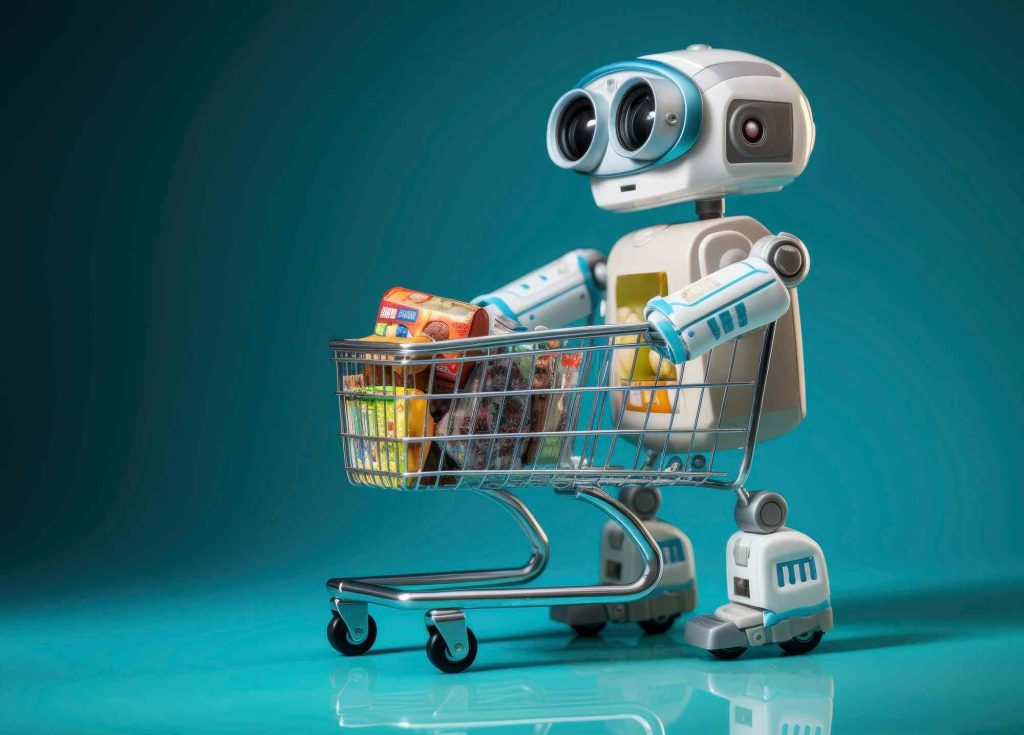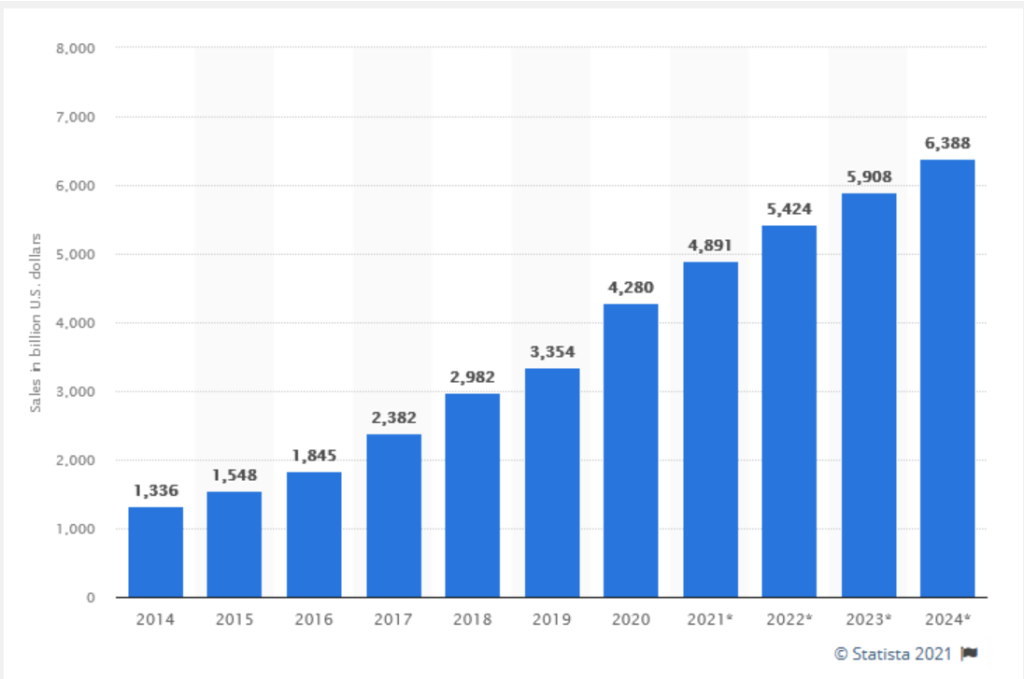AI in Ecommerce: Maximizing
Potential and Performance

Table of Contents
Artificial intelligence (AI) in a nutshell, is the ability of machines to mimic humans. This includes tasks like learning from data, making decisions, and even solving problems. Through sophisticated algorithms and machine learning, AI solutions are revolutionizing the e-commerce experience.
But how is AI used in ecommerce exactly? AI in e-commerce analyzes your browsing habits, purchases, and even demographics to recommend the perfect products. Using AI in e-commerce goes beyond recommendations. It predicts your needs, optimizes inventory, personalised marketing, and even answers questions with chatbots 24/7. Generative AI designs custom products based on your style or crafts brand-specific marketing materials – all powered by AI.
Which Types of AI Technology are used in Ecommerce?
AI in ecommerce is rapidly transforming the landscape, with businesses across every function embracing its potential. From personalized product recommendations to predictive inventory management, Artificial Intelligence in e-commerce is unlocking new levels of efficiency, customer satisfaction, and profitability.
Forget thinking of AI as a single tool—it’s a toolbox! Four key technologies are driving the e-commerce revolution:
Machine Learning (ML):
Think of this as learning without being explicitly taught. Through algorithms, machine learning in e-commerce analyzes data to make predictions, like recommending the perfect running shoes based on your past purchases (even if you haven’t mentioned “running shoes”!). Deeper learning models, like transformers and large language models, take this a step further by layering algorithms for even better understanding.
Natural Language Processing (NLP):
This lets computers understand and generate human language, powering features like chatbots that answer your questions or personalize product recommendations.
Data Mining:
Imagine finding hidden treasures in a data mountain. Data mining uncovers patterns and insights to fuel other AI technologies, making them smarter and more effective.
Computer Vision (CV):
Eyes for your machines! CV technology enables computers to “see” and interpret images and videos, leading to features like virtual try-ons for clothes or automatic image-based product searches.
What are the Applications of AI in E-commerce?
Artificial intelligence (AI) is rapidly transforming the e-commerce landscape, offering innovative solutions that enhance both the customer experience and business operations. Let’s delve into some key applications of AI that are shaping the future of online shopping including AI in B2B ecommerce :
Virtual Assistants and Chatbots:
Imagine having a personal shopping assistant available 24/7, ready to answer your questions, guide you through product options, and even place orders for you. That’s the power of AI-powered virtual assistants and chatbots. These intelligent tools provide instant customer support, answer frequently asked questions, and even offer personalized recommendations, streamlining the shopping experience and boosting customer satisfaction.
If you’re ready to take your business to the next level with AI-powered virtual assistants and chatbots, don’t hesitate to reach out. Contact us today to learn how we can help boost your ecommerce store’s efficiency and enhance customer satisfaction.
Personalized Product Suggestions:
Gone are the days of generic product recommendations. AI algorithms leverage your browsing history, purchase behaviour, and even demographic data to curate a personalized selection of products just for you. Think breathable running shoes for your hot climate or comfortable options based on past purchases indicating heel pain. This hyper-personalized approach increases the likelihood of a purchase and fosters customer loyalty.
Visual and Voice Search:
Searching for products online is becoming more intuitive and engaging thanks to AI-powered visual and voice searches. Imagine taking a picture of a product you like and finding similar items, or simply speaking your desired item into your phone and having relevant options displayed. These technologies not only enhance accessibility but also speed up the search process, leading to quicker conversions.
Inventory Management:
Predicting customer demand and ensuring optimal inventory levels are crucial for e-commerce success. AI algorithms analyze historical data, seasonal trends, and current market conditions to provide accurate demand forecasts. This empowers businesses to optimize inventory management, minimize stockouts, and maximize profitability.
Demand Forecasting:
Forecasting demand can be tricky, but AI takes the guesswork out of it. By analyzing vast datasets, AI models predict future sales trends and customer behavior, enabling you to make informed decisions about inventory, production, and marketing strategies. This leads to improved efficiency, reduced costs, and maximized profits.
What is the Benefit of AI in E-commerce?
Traditional companies are finding it much easier to enter the ecommerce space, expand quickly, and even expand internationally thanks to the benefits of AI. Here are some of the benefits of AI in ecommerce that are improving online shopping by leaps and bounds:
Increased Sales:
Imagine a virtual shopping assistant who knows your customers better than they know themselves! Artificial intelligence in e-commerce analyzes browsing behavior, purchase history, and demographics to recommend relevant products, leading to higher conversion rates and increased sales. Think personalized product suggestions, targeted promotions, and dynamic pricing strategies that attract customers and maximize revenue.
Enhanced Customer Service:
Tired of waiting on hold? AI-powered chatbots are here to help! These intelligent assistants answer frequently asked questions, guide customers through the buying process, and even solve simple problems 24/7. This translates to faster resolutions, happier customers, and improved brand loyalty.
Better Segmentation of your Customers:
Not all customers are created equal. AI unlocks powerful insights into customer behavior and preferences, allowing you to segment your audience into groups with similar characteristics. This enables you to tailor marketing campaigns, product recommendations, and promotions for each segment, maximizing engagement and conversions.
Improved Logistics:
From optimizing inventory management to predicting demand, AI tools streamline your e-commerce operations. Say goodbye to stockouts and hello to efficient fulfillment! AI analyzes data to ensure you have the right products in stock at the right time, reducing costs and improving customer satisfaction.
Fraud Detection and Prevention:
Protecting your customers and your business is paramount. AI-powered systems analyze transactions in real-time, identifying suspicious patterns and preventing fraudulent activities. This ensures a secure shopping experience for your customers and protects your business from financial losses.
What are the Challenges of AI in E commerce?
While AI offers immense potential, implementing it in e-commerce isn’t without its hurdles. Here are some key challenges of AI in ecommerce:
Cost and Complexity: AI tools for ecommerce can be expensive to develop and implement, requiring specialized expertise and resources.
Data Quality and Bias: AI algorithms rely on high-quality, unbiased data to function effectively. Gathering and ensuring data integrity can be complex.
Transparency and Explainability: Understanding how AI models make decisions can be challenging, raising concerns about transparency and bias.
Ethical Considerations: The use of AI raises ethical questions, such as privacy concerns and potential job displacement.
Integration with Existing Systems: Integrating AI with existing e-commerce systems can be complex and require technical expertise.
How is AI changing the E-Commerce industry?
From the moment you click onto an eCommerce business website to the final delivery at your doorstep, AI is subtly, but undeniably, changing every aspect of the e-commerce experience.
AI ecommerce platforms are now analyzing vast datasets about your behavior, preferences, and even demographics, crafting personalized journeys for each individual. But the impact of artificial intelligence on e-commerce goes far beyond product recommendations.AI solutions for e-commerce including generative AI , are revolutionizing From optimizing inventory and predicting demand to streamlining logistics and enhancing security, AI is quietly revolutionizing operations and boosting efficiency at every stage of the e-commerce journey.
This is merely the beginning of the future of AI in e-commerce. As AI technology advances, we can expect even more innovative applications to emerge, further blurring the lines between reality and personalized online experiences. One thing is clear: AI is the future of e-commerce, it is not just changing the e-commerce industry. Artificial intelligence in business is crucial for any company that wants to be positioned for success in the years to come.
Final Words:
While challenges exist, the potential role of AI in ecommerce businesses is undeniable. From personalized shopping experiences to optimized operations, AI ecommerce promises to revolutionize the industry and create a future where convenience, efficiency, and satisfaction are paramount. Businesses that embrace AI today will be the ones shaping the future of e-commerce, leaving the hesitant behind in the dust. So, don’t just witness the change, be a part of it. The future is intelligent, the future is personalized, the future is powered by AI.
Frequently Asked Questions:
The future of AI in ecommerce is booming, with a projected market value of $45.72 billion by 2032. This explosive growth reflects the increasing importance of AI for e-commerce businesses, with 84% prioritizing its adoption. AI is demonstrably delivering results, with improvements exceeding 25% in customer satisfaction, revenue, or cost reduction. This suggests AI is not just a trend, but a transformative force shaping the future of online shopping.
AI personalizes journeys, predicts needs, and optimizes everything from product recommendations to chatbots. Imagine AI suggesting perfect shoes after analyzing past purchases, crafting targeted ads based on preferences, or chatbots answering questions 24/7. This data-driven magic boosts sales, satisfaction, and efficiency, making AI a marketing must-have.
Product suggestions driven by AI are transforming the online retail industry. Artificial intelligence in ecommerce can assess consumer information, such as browsing and purchase history, to offer customized suggestions that make sense to the customer and drive them to make a purchase.
Amazon is currently the world’s largest e-commerce business with a market share of approximately $1.55 trillion. This topmost position reflects their extensive reach, diverse product portfolio, and constant innovation within the e-commerce landscape.
The e-commerce market in AI is extensive and continuously growing. AI technologies are increasingly integrated into various aspects of e-commerce, including customer service, personalized product recommendations, and fraud detection. With businesses recognizing the benefits of AI in enhancing efficiency, the e-commerce market in AI is expected to reach a market size of $22.6 billion by 2032.

Zara Finch
Zara, an experienced professional in the SEO industry for the past two years, is passionate about discussing technology, innovations, and the ever-evolving digital landscape. With a keen interest in exploring the latest trends and developments, she brings valuable insights and expertise to her work.








You’re so awesome! I don’t believe I have read a single thing like that before. So great to find someone with some original thoughts on this topic. Really.. thank you for starting this up. This website is something that is needed on the internet, someone with a little originality!